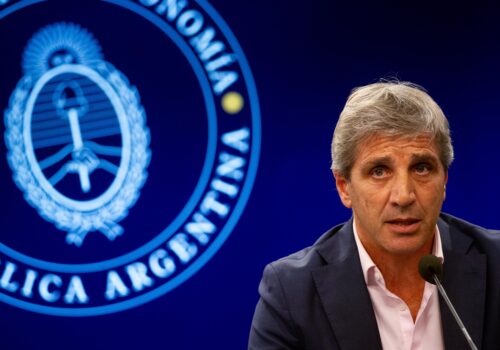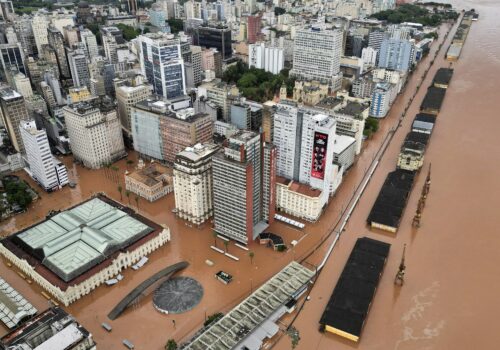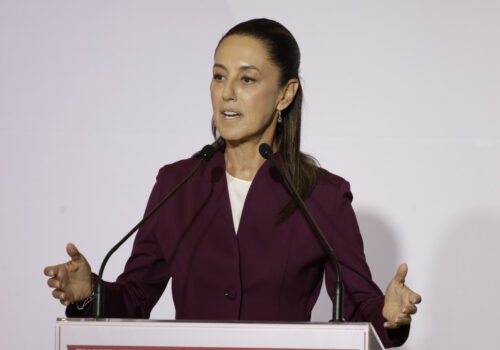Argentina’s Milei government last week received its second blessing from the International Monetary Fund (IMF) for its hard-hitting economic reforms. The lender’s executive board agreed to pay out the next of several small disbursements that remain under Argentina’s 2023 program, which was on hold after the previous Peronist government reneged on its policy commitments. Although the Milei administration had to make significant concessions to pass its reforms through Argentina’s Senate, the resumption of the program has been entirely justified. In fact, the IMF had disbursed much larger amounts to the Fernández administration to avoid a default on its earlier loan, without getting meaningful reforms from the government in return.
Compared to last year’s economic free-fall, Argentina’s situation is indeed looking up. President Javier Milei and his team have embarked on a serious fiscal adjustment initiative and are making a determined effort to bring inflation down from record levels. These policies have met with considerable early success, but the austerity measures needed to reduce the fiscal deficit have led to massive social disruption and serious street protests against the government.
Despite these early achievements, the real issues facing Argentina remain low productivity, a weak growth outlook, and large external financing needs in the foreseeable future. Together, they call into question whether Argentina will be able to crawl out from under its large debt burden and access markets to obtain fresh financing beginning in 2025, as projected by the latest IMF staff report. This forecast corresponds to an exceedingly optimistic scenario, in which continued reforms lead to an improvement in Argentina’s twin deficits, culminating in a strong pickup in capital flows in the medium term.
In reality, it is more likely that the reform momentum will be slowed by hardening opposition in the National Congress of Argentina, in particular in the Senate, where Peronist provincial governments still hold sway. Further exchange rate depreciation, the lack of a strong rebound in labor markets, and accumulating pain from continued austerity will also impair Milei’s hopes of gaining a parliamentary majority of his own during next year’s midterm elections.
A drubbing at the polls could throw Argentina back to square one. Both of the last two governments were hobbled by weak election outcomes halfway through their presidents’ terms. Despite Milei’s popularity with a large part of the Argentinian public, failure to array Congress behind his movement could again leave Argentina with a lame duck government and a half-completed reform agenda.
In such a situation, the envisaged liberalization, if not outright dollarization, of Argentina’s exchange rate regime—which still seems to be one of the president’s key objectives—is bound to fail. The country would need a strong and growing economy to sustain the kind of fiscal discipline that is required for a stable exchange rate regime, and this will not be possible without deep changes to Argentina’s economic laws and structure, starting with the government’s own footprint.
Such changes require a societal consensus toward market-friendly reforms, but also toward the appropriate distribution of incomes in case growth takes off. In Argentina, such middle ground between radical reform and government largesse has been elusive for decades, and it is unlikely to be found unless the main political camps are prepared to compromise.
Without dismissing this possibility outright, it is much more likely that the economic hardship currently experienced by ordinary Argentineans will drive voters back toward the main opposition party. The Peronist party will, without doubt, promise large handouts to core constituencies that abandoned them during the last elections, frustrated by high inflation and rising unemployment. And as the economic environment is stabilizing, many voters will have forgotten who was responsible for Argentina’s precarious situation in the first place.
The IMF should therefore remain cautious in its discussions with the current government. The institution was wrong to lower its standards for the current program, which granted Argentina a fairly easy restructuring of its repayment terms, an operation that is in principle ruled out by the IMF’s own statutes. Going forward, the fund should be leery of granting Argentina fresh money, digging itself even deeper into a hole that is already threatening to upend its own balance sheet (and possibly imposing losses on shareholders whose per-capita income is still below Argentina’s).
Instead, any new relationship with Argentina should be based on conditionality that ensures sustained growth and the eventual repayment of Argentina’s debt. As it failed to do in 2022, the IMF should insist that both political camps sign on to a meaningful reform program. Otherwise, it risks a reprise of the Macri experience, when IMF funds provided the incumbent government with a financial war chest to support its reelection which the next opposition-led government did not feel obliged to repay when it came to power.
Martin Mühleisen is a nonresident senior fellow at the Atlantic Council’s GeoEconomics Center and a former IMF official with decades-long experience in economic crisis management and financial diplomacy.
Further reading
Fri, Jan 12, 2024
Argentina needs reforms even more than the IMF’s money
New Atlanticist By Martin Mühleisen
Buenos Aires must take a sustained path of economic reform or face an uncertain future with prolonged misery, social hardship, and continued decline.
Tue, May 14, 2024
Brazil’s tragic floods should put climate adaptation at the top of the G20 and COP agendas
New Atlanticist By Valentina Sader
The ongoing flooding in Rio Grande do Sul is an example of the urgent need for countries to focus on adapting to climate change.
Tue, Jun 4, 2024
Three ways Mexico’s new president could transform Central America
New Atlanticist By María Fernanda Bozmoski
The first female president of Mexico has the opportunity to redefine her country’s role in Central America, address the root causes of migration, and promote a more stable and prosperous region.
Image: Argentina's president Javier Milei gestures as he addresses the Conservative Political Action Conference (CPAC) annual meeting in National Harbor, Maryland, U.S., February 24, 2024. REUTERS/Elizabeth Frantz



